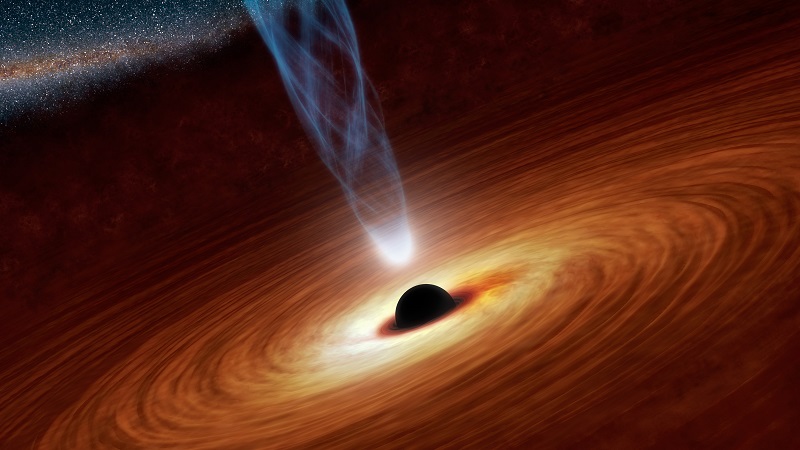21st Century Wire asks…
So what happens after you pass through a black hole?
It’s a theory known as the ‘black hole information paradox’ and it is said to result from a phenomenon which combines quantum mechanics and the theory general relativity. The paradox suggests that physical information would permanently disappear into a black hole, allowing many physical states to devolve into the same state, and the black hole to “radiate away.”
“In order to understand why the information loss problem is a problem, we need first to understand what it is. Take a quantum system in a pure state and throw it into a black hole. Wait for some amount of time until the hole has evaporated enough to return to its mass previous to throwing anything in. What we start with is a pure state and a black hole of mass M. What we end up with is a thermal state and a black hole of mass M. We have found a process (apparently) that converts a pure state into a thermal state. But, and here’s the kicker, a thermal state is a MIXED state (described quantum mechanically by a density matrix rather than a wave function). In transforming between a mixed state and a pure state, one must throw away information. For instance, in our example we took a state described by a set of eigenvalues and coefficients, a large set of numbers, and transformed it into a state described by temperature, one number. All the other structure of the state was lost in the transformation.” (Source: UCR)
 Hoping to crack the 40 year long puzzle, physicist Stephen Hawking’s (photo, left) latest theory is certainly interesting and worthy of discussion. He’s proposing that information does not merely ‘pass through’ the black hole, it’s also stored along what’s known as the “event horizon” of the black hole boundary, in a “super translation.”
Hoping to crack the 40 year long puzzle, physicist Stephen Hawking’s (photo, left) latest theory is certainly interesting and worthy of discussion. He’s proposing that information does not merely ‘pass through’ the black hole, it’s also stored along what’s known as the “event horizon” of the black hole boundary, in a “super translation.”
But there’s still a ways to go before this phenomenon can really be known and the problem truly solved, theoretically anyway…
What would happen if you fell into a black hole?
This question is not only entertaining (you might turn into spaghetti, according to some theories), but it’s also important to theoretical physicists. Unfortunately, they’re not even sure what happens when a single particle falls in, and it’s been a big problem in physics for 40 years.
Quantum theory — the laws that govern how tiny particles work—says that anything that falls into a black hole is lost forever. But Einstein’s general relativity says that’s impossible: the total amount of stuff in the universe has to remain constant.

(Image Source: Wikicommons)
Over the years, scientists have come up with a variety of theories that try to resolve this paradox. Yesterday, at a conference in Sweden, famed physicist Stephen Hawking threw his hat into the ring.
Hawking suggests that when information falls into a black hole, it might get translated into a 2D hologram on the surface of the event horizon, the sort of membrane that surrounds the black hole. Those copies could “contain all the information that would otherwise be lost,” says Hawking.
As for the stuff that actually makes it in, he speculates that if the black hole is large and rotating, the stuff might wind up in another universe.
But these ideas have actually been around for a while. Hawking’s announcements dive deeper than that. To help explain what all the hubbub’s about, Popular Science talked to Grant Remmen, a theoretical physics graduate student at Caltech.
‘Getting Under The Hood’
Nothing can escape a black hole, right? Wrong! Years ago, Hawking demonstrated that, actually, heat can escape. The stuff that black holes spit out is called “Hawking radiation” in his honor.
Hawking radiation plays a key role in most of the theories that attempt to solve the riddle of what happens to information that falls into a black hole. Because if Hawking radiation is just heat, that means the information really does disappear forever, and the laws that we think govern the universe have a big gaping hole in them.
However, if Hawking radiation also contains some other tiny bits of information, it could be enough to resolve the paradox…
Continue this article at Popular Science
READ MORE ANCIENT HISTORY NEWS AT: 21st Century Wire Ancient History Files














